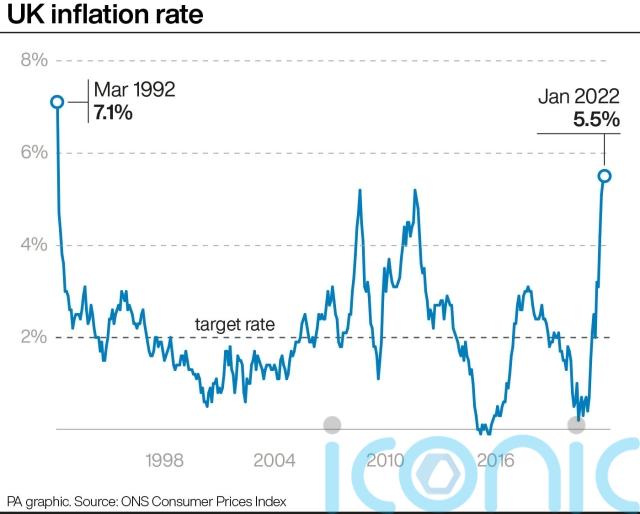
The Chancellor was dealt a blow ahead of Wednesday’s spring statement as official figures showed higher-than-expected Government borrowing last month after soaring inflation saw interest payments hit record levels.
The Office for National Statistics (ONS) said interest payments on Government debt jumped to £8.2 billion last month, up from £5.4 billion a year earlier and the highest for any February on record.
It came as UK inflation jumped to 30-year highs due to rocketing energy and fuel prices and as a result of supply chain problems.
Public sector net borrowing excluding public sector banks was £13.1 billion in Feb 2022.
This was the second-highest Feb borrowing since monthly records began in 1993 – £2.4 billion less than the record set in Feb 2021 https://t.co/4jY1ciKEwo pic.twitter.com/uqQIKV8AS5
— Office for National Statistics (ONS) (@ONS) March 22, 2022
The Office for Budget Responsibility (OBR) is set to reveal its latest predictions for inflation alongside the Chancellor’s spring statement on Wednesday, with suggestions it could hit double digits later this year as the impact of the Ukraine conflict takes hold in the UK economy.
The ONS said the jump in UK debt interest payments is down to the recent surge in the Retail Prices Index (RPI) measure of inflation, which determines payouts on index-linked gilts.
RPI rose to its highest level since March 1991, hitting 7.8% in January, up from 7.5% in December. Inflation for February is revealed on Wednesday.
The ONS data showed that the rising interest payments came despite borrowing falling year on year to £13.1 billion in February, down by £2.4 billion from the same month a year earlier.
But the February borrowing figure was far more than the £8.3 billion expected by most economists and the £8.1 billion predicted by the OBR as higher tax receipts were offset by the jump in interest payments.

Public sector borrowing in the financial year to February was £138.4 billion, the third highest since records began in 1993, though it was less than half of the £290.9 billion borrowed in 2020-21 at the height of the pandemic.
The year-to-date figure is still £21.3 billion less than forecast by the OBR, which may give the Chancellor some spending wiggle room in his mini-Budget.
The data showed that public sector debt, excluding public sector banks, remained at a level not seen since the early 1960s – at £2.3 trillion at the end of February, or around 94.7% of gross domestic product (GDP).
The Chancellor said: “The ongoing uncertainty caused by global shocks means it’s more important than ever to take a responsible approach to the public finances.
“With inflation and interest rates still on the rise, it’s crucial that we don’t allow debt to spiral and burden future generations with further debt.”
Subscribe or register today to discover more from DonegalLive.ie
Buy the e-paper of the Donegal Democrat, Donegal People's Press, Donegal Post and Inish Times here for instant access to Donegal's premier news titles.
Keep up with the latest news from Donegal with our daily newsletter featuring the most important stories of the day delivered to your inbox every evening at 5pm.